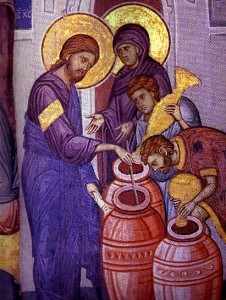Something rather odd struck me at the Gospel reading this past Sunday, during which we heard the story of the Wedding Feast at Cana. After Jesus changes the water into wine he has the servants take some to the headwaiter who then says something that must have been rather disturbing to the bridegroom, “Everyone serves good wine first, and then when people have drunk freely, an inferior one; but you have kept the good wine until now.” (Jn 2:10)
 Now, in the culture of the time it would have been a serious cultural faux pas for the bridegroom to not have been sure to provide enough wine for all those in the wedding party to last during the week-long celebration. This was likely, at least partly, the motivation behind Mary’s request to Jesus. Much theological ink has been spilled over their very brief discussion but what struck me this time was that this poor bridegroom did still get embarrassed, just not in the way that it originally would have happened. I have to imagine the headwaiter’s comment to the bridegroom as anything better than a backhanded compliment, although I can’t yet seem to find much scholarly input on this particular sentence as everyone tends to focus rather on the miracle Jesus performs and Mary’s intervention.
Now, in the culture of the time it would have been a serious cultural faux pas for the bridegroom to not have been sure to provide enough wine for all those in the wedding party to last during the week-long celebration. This was likely, at least partly, the motivation behind Mary’s request to Jesus. Much theological ink has been spilled over their very brief discussion but what struck me this time was that this poor bridegroom did still get embarrassed, just not in the way that it originally would have happened. I have to imagine the headwaiter’s comment to the bridegroom as anything better than a backhanded compliment, although I can’t yet seem to find much scholarly input on this particular sentence as everyone tends to focus rather on the miracle Jesus performs and Mary’s intervention.
I’ve been playing over in my mind why this particular point stuck in my head this time and I believe I’ve found it to lie in the fact that I have a particular aversion to public embarrassment and so am always very sensitive to it whenever it comes about even for others. Looking into this, however, I see something else as well. Had the bridegroom known of his impending embarrassment he would have sought intervention. Mary, seeing what the bridegroom did not, interceded on his behalf. I have the sneaking suspicion however that she didn’t expect exactly the kind of resolution Jesus provided.
You see, most of us, when we ask for God to provide us a way out expect it to be a nice clear stroll through a sunlit meadow. Sometimes, when it fits His plan, that’s what happens. Many times, however, because of an understanding that far exceeds our capacity to comprehend, He leaves the brambles and the poison ivy and the pointy little rocks there as well. Could Jesus have turned this water into a wine that would have made nobody expect anything unusual had happened? Absolutely. Could He have done it in a way that never drew anyone’s attention to what had happened? Of course. Instead, however, He did what God always does – He not only gave, but He gave completely and to what we could only consider would be excess. Just as God could have, by virtue of being God, redeemed us by fiat but did not and rather gave us His Son to not only live among us but to die and then rise again from the dead, so Jesus could have given this unsuspecting bridegroom an inferior wine but instead gave him the best of wine despite the momentary discomfort that came with it.
My school teachers always told me I had to have a conclusion paragraph so let me end with this: despite our most sincere desires and prayers and even the prayers of the saints, God will give us exactly what we need rather than what we want and sometimes what we need isn’t quiet as comfortable as we’d hoped. God may choose to work an extravagant miracle right before our eyes and we need to be willing to take that miracle for what it is, accept it and act on it even if it doesn’t match up to our expectations. We must “believe in him” just as His disciples did and trust that He really does know what He is doing.





